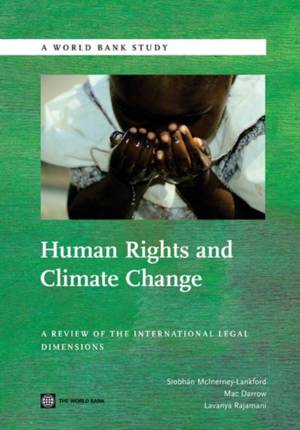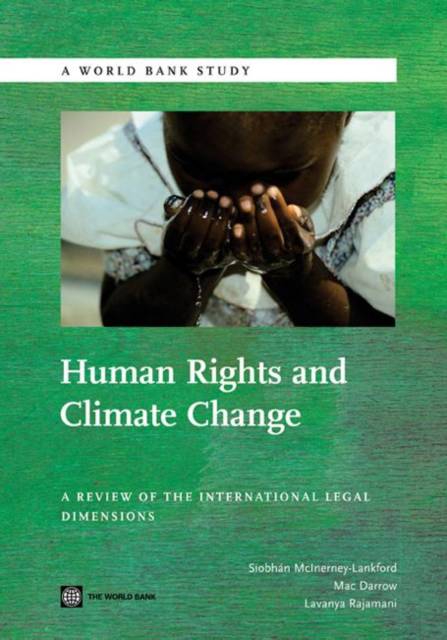
- Retrait gratuit dans votre magasin Club
- 7.000.000 titres dans notre catalogue
- Payer en toute sécurité
- Toujours un magasin près de chez vous
- Retrait gratuit dans votre magasin Club
- 7.000.0000 titres dans notre catalogue
- Payer en toute sécurité
- Toujours un magasin près de chez vous
Human Rights and Climate Change
A Review of the International Legal Dimensions
Siobhan McInerney-Lankford, Mac Darrow, Lavanya Rajamani
24,45 €
+ 48 points
Description
This Study explores arguments about the impact of climate change on human rights, examining the international legal frameworks governing human rights and climate change and identifying the relevant synergies and tensions between them. It considers arguments about (i) the human rights impacts of climate change at a macro level and how these impacts are spread disparately across countries; (ii) how climate change impacts human rights enjoyment within states and the equity and discrimination dimensions of those disparate impacts; and (iii) the role of international legal frameworks and mechanisms, including human rights instruments, particularly in the context of supporting developing countries' adaptation efforts. The Study surveys the interface of human rights and climate change from the perspective of public international law. It builds upon the work that has been carried out on this interface by reviewing the legal issues it raises and complementing existing analyses by providing a comprehensive legal overview of the area and a focus on obligations upon States and other actors connected with climate change. The objective has therefore been to contribute to the global debate on climate change and human rights by offering a review of the legal dimensions of this interface as well as a survey of the sources of public international law potentially relevant to climate change and human rights in order to facilitate an understanding of what is meant, in legal terms, by "human rights impacts of climate change" and help identify ways in which international law can respond to this interaction. This is a complex and dynamically evolving legal and policy landscape and this study aims to capture its most salient features insofar as they appear at present. The Study employs the following three-part conceptual understanding of the links between human rights and climate change. First, climate change may affect the enjoyment of human rights: this is explored in part II and draws from the existing work of the United Nations (UN) Office of the High Commissioner for Human Rights (OHCHR), the UN Human Rights Council and the International Council on Human Rights Policy. Second, measures to address climate change may impact the realization of human rights. This is a subset of the discussion of "impacts" targeting "secondary" human rights impacts of measures aimed at addressing climate change. Third, human rights have relevance to policy and operational responses to climate change, such that human rights obligations (both substantive and procedural) may be relevant to the design and implementation of effective responses to climate change, particularly in relation to adaptation and to some extent also to mitigation. Human rights may also have a role in promoting resilience to climate change and may reinforce sustainable development goals.
Spécifications
Parties prenantes
- Auteur(s) :
- Editeur:
Contenu
- Nombre de pages :
- 158
- Langue:
- Anglais
- Collection :
Caractéristiques
- EAN:
- 9780821387207
- Date de parution :
- 18-03-11
- Format:
- Livre broché
- Format numérique:
- Trade paperback (VS)
- Dimensions :
- 178 mm x 254 mm
- Poids :
- 290 g

Les avis
Nous publions uniquement les avis qui respectent les conditions requises. Consultez nos conditions pour les avis.






